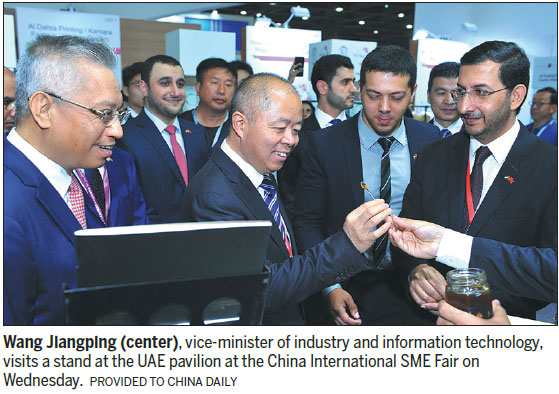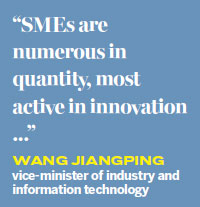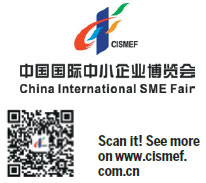Fair emphasizes role of SMEs as key economic drivers
Small and medium-sized enterprises around the world are embracing development opportunities arising from a new round of technological and industrial advances, according to a senior Chinese official.
"SMEs are numerous in quantity, most active in innovation and have had a profound impact on the global community since they have served as a major engine to empower the world economy as a whole," said Wang Jiangping, vice-minister of industry and information technology.
He reiterated the importance of SMEs on Wednesday at the opening of the 15th China International SME Fair in Guangzhou, capital of South China's Guangdong province.

"Many governments are actively exploring new channels, new modes and new techniques to support the globalization of SMEs," said Wang.
In China, SMEs contribute 50 percent of tax revenue, 60 percent of gross domestic product and 70 percent of the technological innovation, as well as employing about 80 percent of the working-age population and accounting for 99 percent of all registered companies, he said.
The Ministry of Industry and Information Technology has mapped out a five-year plan, from 2016 to 2020, to support SMEs by helping them bring in funds, technology, talents and management expertise from abroad, with the aim of sharpening their strengths and helping them access global supply chains.
The China International SME Fair, sponsored by the ministry, the State Administration of Market Regulation and the Guangdong Provincial Government, has developed into the largest of its kind in China. It creates opportunities for overseas SMEs to enter the Chinese market and supports Chinese SMEs who wish to go abroad.
As many as 668 overseas exhibitors are participating this year from 39 countries, regions and international organizations, including Brazil, Russia, South Africa, South Korea, the United Arab Emirates, the United States and the United Nations Industrial Development Organization.

The UAE, which is co-hosting the fair for the first time, is planning a closer partnership with China to develop SMEs, according to Abdullah al-Saleh, the UAE Economy Ministry's undersecretary of foreign trade and industry. He said during the fair that more than 4,000 Chinese companies have been attracted to the UAE by its favorable business environment, investing at least $2.8 billion in the country. Now, many UAE-based companies, especially those in the hospitality and tourism industries, are also planning to come to China, he added.
The UAE delegation has a 1,000 - square-meter exhibition at the event, featuring more than 75 SMEs from a broad range of sectors including agriculture, trade and retail, innovation, technology, hospitality, industry and manufacturing.
UNIDO, a specialized agency of the United Nations that promotes industrial development for poverty reduction, inclusive globalization and environmental sustainability, began co-hosting the fair last year and has agreed to extend its support for another five years.
A variety of conferences, promotions and competitions are taking place at the fair, including a themed forum on Wednesday called the China SME Summit that saw officials from the central and provincial governments give authoritative interpretations of the latest laws, regulations and policies affecting SMEs.
Meanwhile, a cross-border business "matchmaking" activity brought together some 164 overseas SMEs from countries and regions such as Thailand, Sri Lanka and Nigeria with 322 of their Chinese counterparts..

O. Ayeni Abimbola Kafilat, CEO of Bimkaf Palace, an oil and food processing company from Nigeria with 13 full-time workers, said the matchmaking activity was very helpful and effective.
"I've already found potential partners to import our products into China. Hopefully we will sign the agreements to decide the price and quantities before I leave," she said.
Kafilat added that she had also met with a Chinese company that could provide equipment adopting photovoltaic technology to her factory, to provide supplemental power in the event of a shortage.
chenhong@chinadaily.com.cn
(China Daily European Weekly 10/12/2018 page31)















